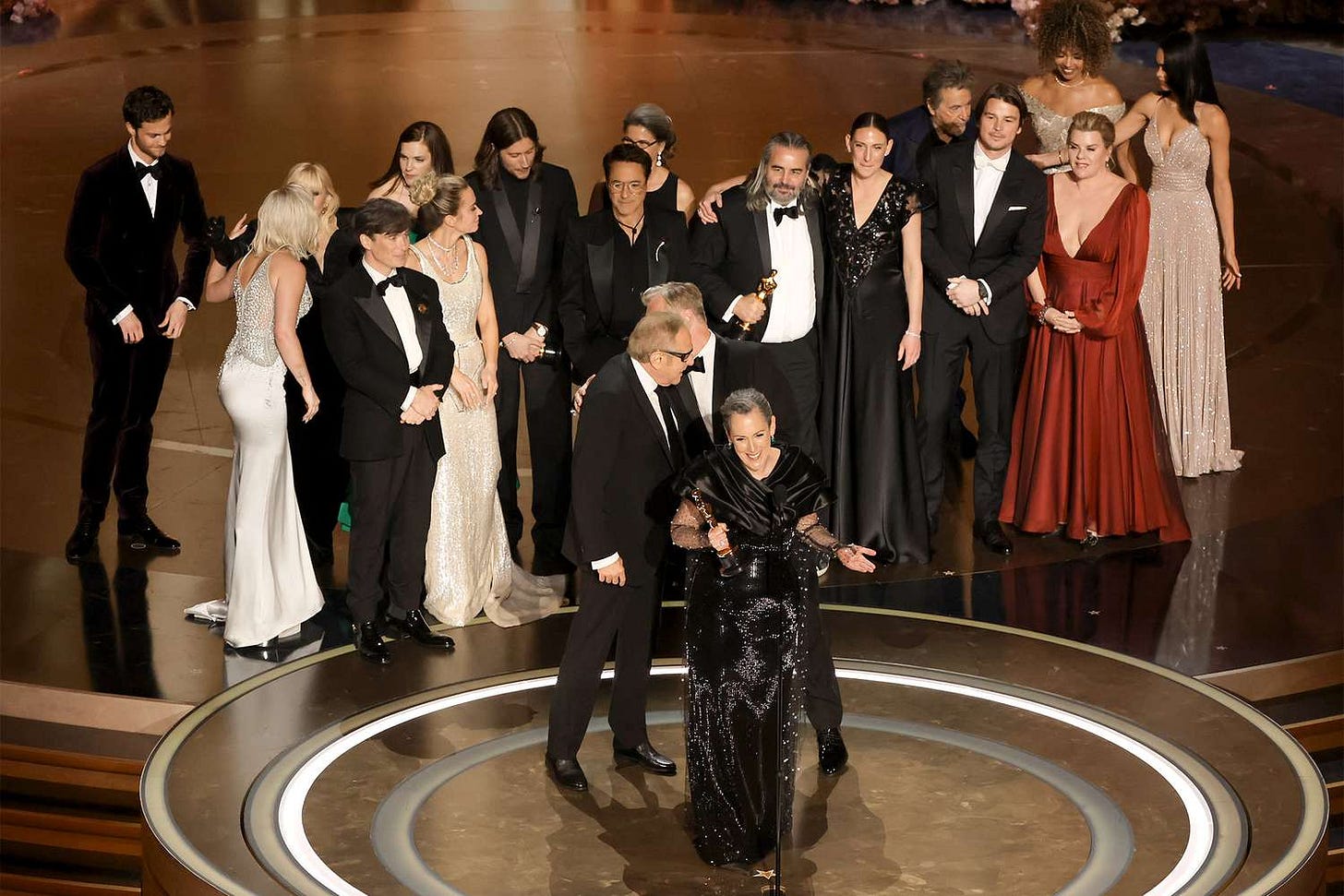Closing the Book on the 96th Academy Awards
A write-up on the 96th Academy Awards, including the ceremony and winners.
Now that the 96th Academy Awards have commenced, it’s time for a post-mortem write-up.
In my opinion, the ceremony itself wasn’t that bad. Host Jimmy Kimmel did a good enough job and managed to avoid doing what, at this point, is one big fear I have about awards show monologues: Jokes about how the movies nominated are boring or nobody saw them. Although he did a crack about the three-hour length of Killers of the Flower Moon, at least he avoided any jokes along the lines of “this movie didn’t make money” or “it was boring” because, frankly, those at the ceremony representing such movies surely don’t want to hear such jokes. After all, whether intended or not, such jokes make them feel like their movies aren’t worthy of being there and feel inappropriate in a ceremony meant to celebrate cinema.
Meanwhile, as for presentations, the award for best presenters easily goes to Kate McKinnon and America Ferrera who presented the Oscars for Best Documentary Feature and Best Documentary Short and got Steven Spielberg to play along in their hilarious Jurassic Park quip (Get them to host the Oscars, ASAP!!). I also loved Ryan Gosling (aka the ceremony’s MVP between this and the “I’m Just Ken” performance) and Emily Blunt’s presentation bit as they presented an ode to stunt performers. Although, as nice as it is they did a tribute honoring stunt acting, there is..an even better way for AMPAS to honor stunt performers. I’m just throwing that out there.
Next, there are the winners. Going into the ceremony, the suspense wasn’t whether Oppenheimer would win Best Picture, but how many more awards it would take home. As it turns out, along with Best Picture, it took home six other trophies: Best Director, Best Actor, Best Supporting Actor, Best Editing, Best Cinematography, and Best Original Score. Meanwhile, the other big winner was Yorgos Lanthimos’ Poor Things, which took home four awards: Best Makeup & Hairstyling, Best Costume Design, Best Production Design, and of course, Best Actress for Emma Stone.
The latter victory proved to be a bittersweet one. As deserving as Emma Stone was for her virtuoso leading turn as Bella Baxter, in a close match-up, it still came at the expense of Lily Gladstone, who would’ve made history as the first Native American to win an acting Oscar. As someone who pulled for Gladstone to win, I thought it was unfortunate that a victory didn’t happen. However, Gladstone’s nomination alone is historic and it was a case of two different performances that impressed in equal measure having the misfortune of being nominated the same year. The bigger concern is ensuring Gladstone gets more leading roles. Thankfully, Gladstone is already getting such opportunities.
After Michelle Yeoh made history last year, Gladstone’s loss means we must wait a bit longer for another actress of color to win a Lead Actress trophy. However, what matters more is more opportunities so that performers like Gladstone or the un-nominated Greta Lee can have more chances to get Oscar buzz or so Best Supporting Actress winner Da’Vine Joy Randolph, who had the most dominant awards sweep I’ve seen of any performer since following the Oscars, can make a return as a nominee. Like Viola Davis said in her famous Emmy speech nine years ago: “The only thing that separates women of color from anything else is opportunity.”
Some other highlights include Cord Jefferson winning Best Adapted Screenplay for American Fiction. If only because he gave one of the night’s best speeches. Jefferson’s call for studios to invest in more mid-budget films rings true as we see a resurgence of the mid-budgeter with films like Anyone But You, The Beekeeper, Mean Girls, and the previously mentioned Poor Things becoming profitable hits.
Then there are all the wins for international cinema. For instance, besides Best International Feature, the German-language film The Zone of Interest won the award for Best Sound. Meanwhile, Godzilla Minus One won Best Visual Effects while Hayao Miyazaki’s The Boy and the Heron won the award for Best Animated Feature. Also, Anatomy of a Fall screenwriters Justine Triet and Arthur Harari claimed the Best Original Screenplay prize.
Another noticeable trend along the winners is how it was an underwhelming night for streamers. Outside of Best Live Action Short for The Wonderful Story of Henry Sugar, Netflix almost went home empty-handed while Apple TV+ got goose-egged. While American Fiction, an Amazon MGM title, won Best Adapted Screenplay, it was still released through their Orion Pictures label. Whether it was intentional or not, the winners skewing heavily toward films with traditional theatrical releases shows the Academy giving mixed messages to streaming giants. For all the nominations Netflix amasses each year, the top prize still evades them. Additionally, after being the first streamer to win Best Picture with CODA, time will tell if Apple TV+ will continue having more mixed results.
In the end, seeing the Academy continue to both embrace international films outside of the International Feature category and break the mold of what an “Oscar movie” is by rewarding films like Poor Things with top prizes are signs of forward thinking. Here’s hoping both trends continue and, of course, may whoever hosts the Oscars next please refrain from joking about a film’s three-hour length or that nobody saw it.


